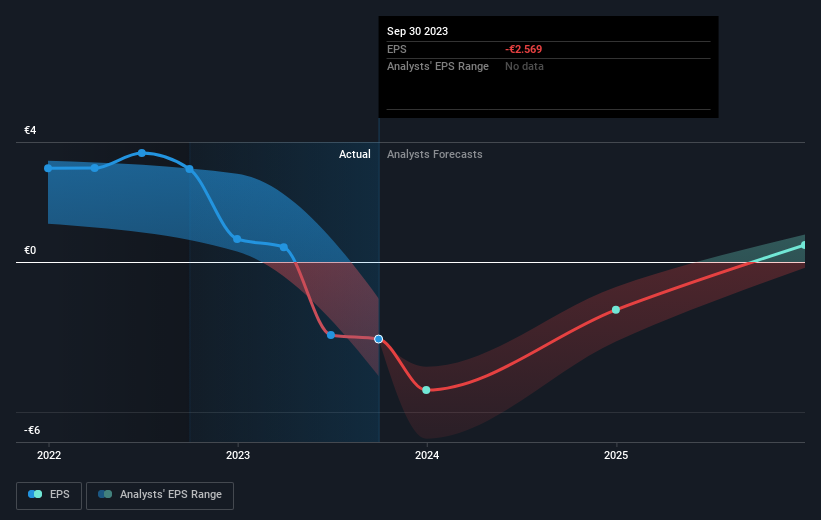- Germany
- /
- Real Estate
- /
- XTRA:GYC
Shareholders in Grand City Properties (ETR:GYC) have lost 55%, as stock drops 3.7% this past week

If you love investing in stocks you're bound to buy some losers. Long term Grand City Properties S.A. (ETR:GYC) shareholders know that all too well, since the share price is down considerably over three years. Sadly for them, the share price is down 59% in that time. Even worse, it's down 9.0% in about a month, which isn't fun at all.
If the past week is anything to go by, investor sentiment for Grand City Properties isn't positive, so let's see if there's a mismatch between fundamentals and the share price.
See our latest analysis for Grand City Properties
To quote Buffett, 'Ships will sail around the world but the Flat Earth Society will flourish. There will continue to be wide discrepancies between price and value in the marketplace...' By comparing earnings per share (EPS) and share price changes over time, we can get a feel for how investor attitudes to a company have morphed over time.
Over the three years that the share price declined, Grand City Properties' earnings per share (EPS) dropped significantly, falling to a loss. Extraordinary items contributed to this situation. Since the company has fallen to a loss making position, it's hard to compare the change in EPS with the share price change. However, we can say we'd expect to see a falling share price in this scenario.
The company's earnings per share (over time) is depicted in the image below (click to see the exact numbers).

Before buying or selling a stock, we always recommend a close examination of historic growth trends, available here.
What About Dividends?
When looking at investment returns, it is important to consider the difference between total shareholder return (TSR) and share price return. Whereas the share price return only reflects the change in the share price, the TSR includes the value of dividends (assuming they were reinvested) and the benefit of any discounted capital raising or spin-off. So for companies that pay a generous dividend, the TSR is often a lot higher than the share price return. We note that for Grand City Properties the TSR over the last 3 years was -55%, which is better than the share price return mentioned above. The dividends paid by the company have thusly boosted the total shareholder return.
A Different Perspective
While the broader market gained around 2.8% in the last year, Grand City Properties shareholders lost 13% (even including dividends). However, keep in mind that even the best stocks will sometimes underperform the market over a twelve month period. However, the loss over the last year isn't as bad as the 9% per annum loss investors have suffered over the last half decade. We'd need to see some sustained improvements in the key metrics before we could muster much enthusiasm. It's always interesting to track share price performance over the longer term. But to understand Grand City Properties better, we need to consider many other factors. To that end, you should learn about the 3 warning signs we've spotted with Grand City Properties (including 1 which is a bit concerning) .
But note: Grand City Properties may not be the best stock to buy. So take a peek at this free list of interesting companies with past earnings growth (and further growth forecast).
Please note, the market returns quoted in this article reflect the market weighted average returns of stocks that currently trade on German exchanges.
New: Manage All Your Stock Portfolios in One Place
We've created the ultimate portfolio companion for stock investors, and it's free.
• Connect an unlimited number of Portfolios and see your total in one currency
• Be alerted to new Warning Signs or Risks via email or mobile
• Track the Fair Value of your stocks
Have feedback on this article? Concerned about the content? Get in touch with us directly. Alternatively, email editorial-team (at) simplywallst.com.
This article by Simply Wall St is general in nature. We provide commentary based on historical data and analyst forecasts only using an unbiased methodology and our articles are not intended to be financial advice. It does not constitute a recommendation to buy or sell any stock, and does not take account of your objectives, or your financial situation. We aim to bring you long-term focused analysis driven by fundamental data. Note that our analysis may not factor in the latest price-sensitive company announcements or qualitative material. Simply Wall St has no position in any stocks mentioned.
About XTRA:GYC
Grand City Properties
Engages in the residential real estate business in Germany, the United Kingdom, and internationally.
Fair value with imperfect balance sheet.
Similar Companies
Market Insights
Community Narratives





